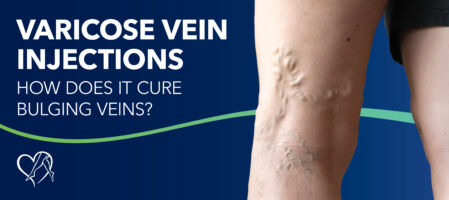
Varicose veins affect millions of people worldwide, causing discomfort, pain, and aesthetic concerns. They develop when the valves in the veins become weakened or damaged, allowing blood to flow backward and pool in the veins. These enlarged and twisted veins, which usually appear on the legs, are often associated with chronic venous insufficiency (CVI), a more advanced stage of venous disease that occurs when the valves in the veins are no longer functioning properly.
Among the various treatment options available, varicose vein injections have emerged as a highly effective solution. But how do these injections work to cure bulging veins? Let's delve into the science and process behind this treatment.
Varicose veins are a visible sign of underlying vein disease, often linked to chronic venous insufficiency (CVI). Vein disease occurs when the veins in the legs struggle to return blood to the heart due to weakened or damaged valves. This malfunction causes blood to pool in the veins, leading to the formation of varicose veins—enlarged, twisted veins that can cause discomfort, swelling, and skin changes.
Varicose veins are not merely a cosmetic concern; they indicate a broader issue of impaired circulation. Left untreated, vein disease can progress, increasing the risk of complications such as leg ulcers and deep vein thrombosis (DVT). Understanding this connection is crucial for early diagnosis and effective treatment, helping to prevent the progression of vein disease and improve overall vascular health.
Varicose vein injections, also known as sclerotherapy, involve injecting a solution directly into the affected veins. This solution irritates the lining of the vein, causing it to collapse and eventually be reabsorbed by the body. Over time, the treated vein fades away, and blood is naturally redirected to healthier veins.
Vein disease, particularly chronic venous insufficiency, is a progressive condition with no definitive cure. As the disease advances, the weakened or damaged valves in the veins worsen, leading to increased blood pooling, swelling, and more severe symptoms over time. While the condition can't be fully cured, early intervention and ongoing management can help slow its progression and alleviate symptoms, improving the quality of life for those affected.
That’s where injectable treatment options for varicose veins come in.
There are different types of solutions used in sclerotherapy:
The vein doctors at Center for Vein Restoration (CVR) are experts in performing sclerotherapy, leveraging years of specialized training and experience in treating vein disease. Our board-certified specialists use advanced techniques to treat varicose and spider veins effectively, ensuring precise, safe, and minimally invasive care. Their patient-centered approach and commitment to excellence have made them leaders in the field of vein care, offering personalized treatments that improve both the health and appearance of their patients' legs.
Call 240-965-3915 to speak to a Patient Services Representative or schedule your consultation online at a CVR near you today.

According to the National Library of Medicine (NIH), injection sclerotherapy to manage varicose vein injections is highly effective, with success rates of up to 80-90 percent for treated veins. Benefits of this treatment include:
Sclerotherapy is generally considered a safe and effective treatment for varicose veins and spider veins when performed by a qualified healthcare provider. The procedure is minimally invasive and typically involves few risks. That said, as with any medical procedure, varicose vein injections carry some risks and potential side effects, including:
Ideal candidates for varicose vein injections include individuals with:
While sclerotherapy is highly effective, there are other treatment options for varicose veins that your Center for Vein Restoration vein specialist may recommend:
The physicians at Center for Vein Restoration are experts in sclerotherapy, offering advanced, minimally invasive treatments to improve your vein health and appearance. With board-certified specialists and a commitment to personalized care, you're in trusted hands at CVR.
CVR accepts most insurance plans for medically necessary varicose vein care.
Call 240-965-3915 to speak with a Patient Services Representative or schedule your consultation online at a CVR location near you to take the next step toward healthier veins.
